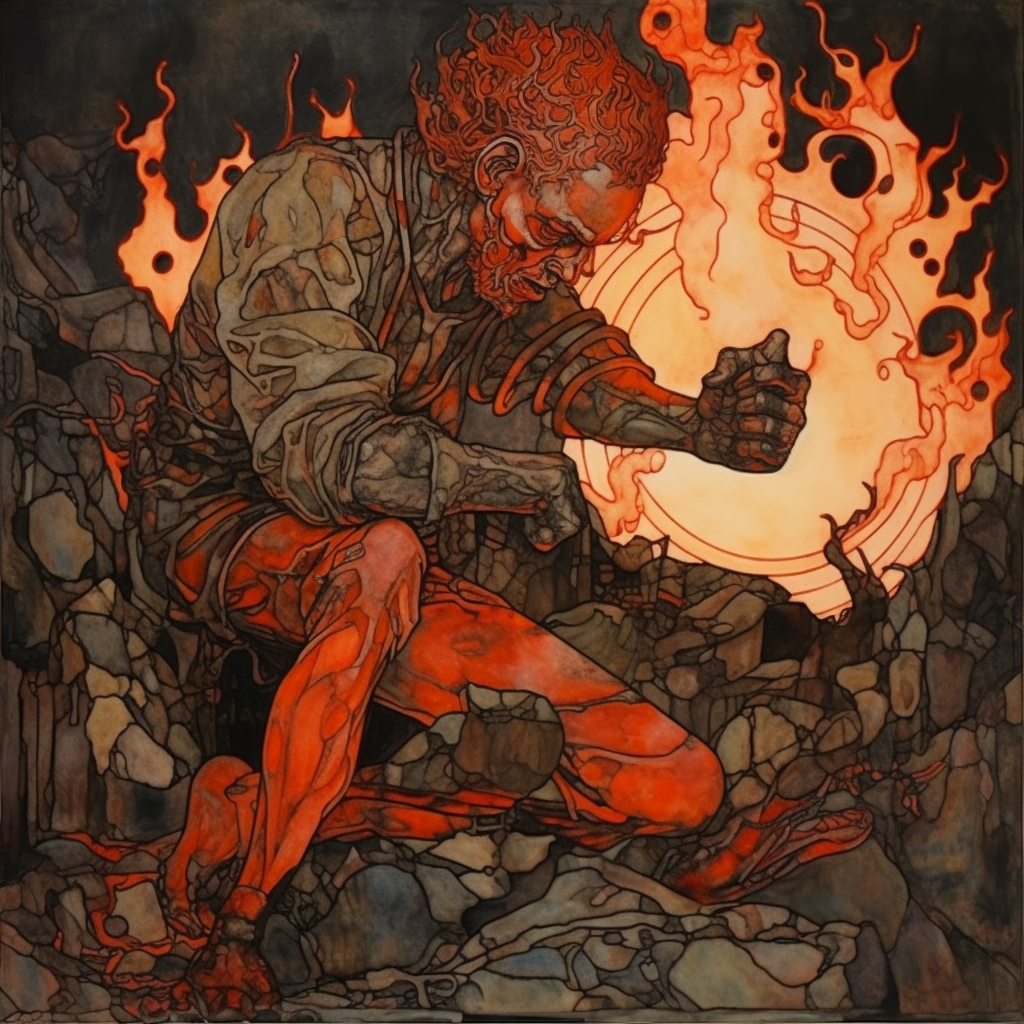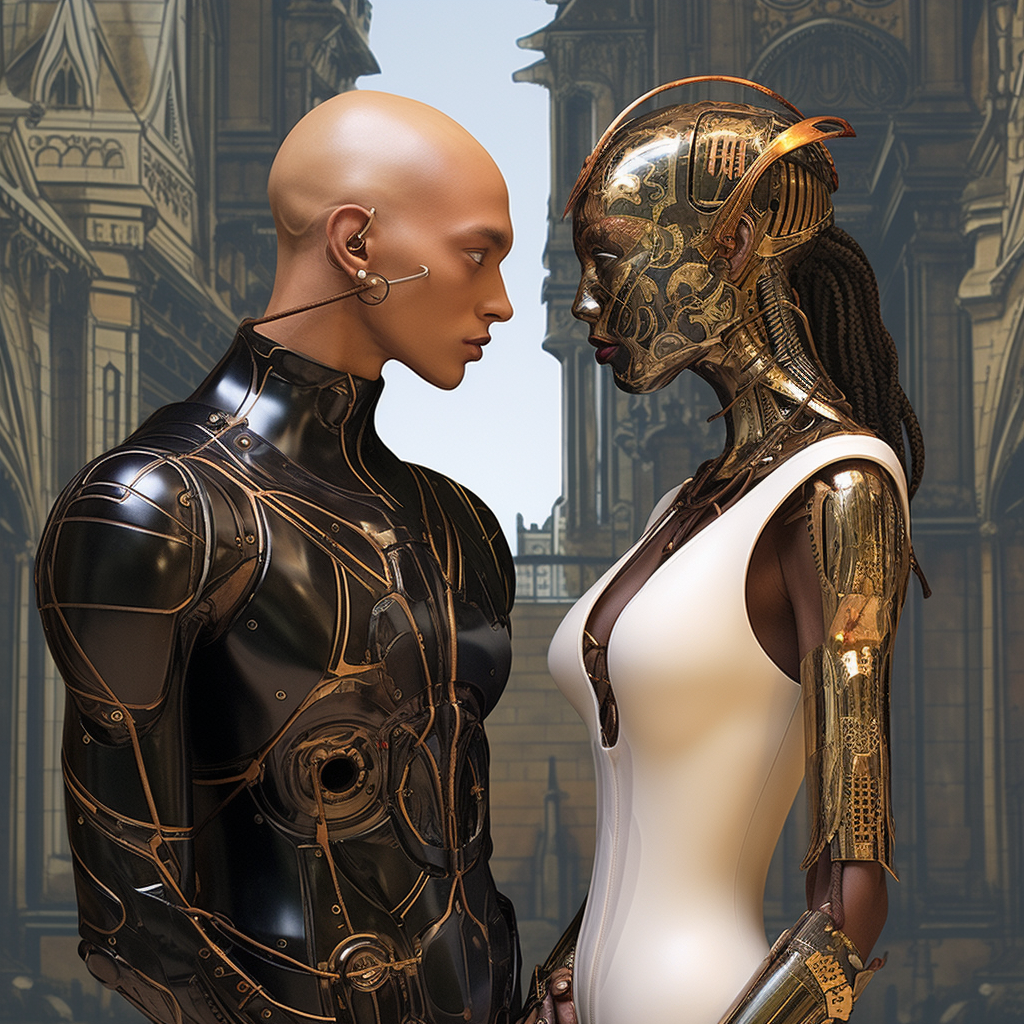The Automatic Myth
Is AI the culmination of the human mythological saga?

In the ancient Greek epics, we find the God of Fire, Hephaestus, creating several automatic, labour-saving beings. The Kourai Khryseai (golden maidens) and the Keledones (Celedones) were gold-plated, women-shaped servants meant to tend to their masters or deities. Likewise, certain dogs (Kuones Khryseos & Argyreos) and tripods (Tripodes Khryseoi) made of silver and gold were crafted to protect palaces. Each account emerges from slave societies whose mythic significance glorifies a long history of conquest and incarceration. Societies that gave birth to robots, made not just by humans, but by the Gods, as well.
The trickster titan, Prometheus, moulded the first humans from clay but noticed they would surely perish without fire. Secretly, he snuck into Hephaestus’ workshop and stole the flame, giving it to his creation. It was only a matter of time before Zeus realized and ordered Hephaestus to send his bronze-built automaton, the Caucasian Eagle, to attack and torture Prometheus for eternity. And what is the price of playing with fire, of using the tools of the Gods? In one ominous telling, Zeus warns that it is “an evil thing in which they may all be glad of heart while they embrace their own destruction.”
In the Christian tradition, humans were made in the likeness of God. And yet, the first humans – Adam & Eve – committed a sin by eating the forbidden fruit of the Tree of Knowledge, becoming self-aware. As punishment, they were exiled from the Garden by God. Here, their aforementioned automatic condition is split: they are both creators and sinners, concurrently. We experience godliness and are exiled because of it.
Adam and Eve’s fallen state was a constant reminder of a divine lineage, but one that was fundamentally diasporic. For countless generations, humans honoured their holy inheritance by inventing tools as physical extensions of the body, as organa. Their creations allowed them to project their will upon the world, stretching far beyond the body. They conceived of technology that no longer required human hands to operate, only to engineer. No longer organa, no longer of the same body. Automatons.

As their techne became more and more complex, they created ideas about themselves and the world ensuring a kind of supremacy in the face of new, strange, and other Gods. They created Progress and Development and found themselves in a Garden of their own making, reseeding that separation anxiety. The more these humans assumed the likeness of Gods, the less and less they seemed to live in the presence of them.
Reflecting the times, some envisioned God as a clockmaker who wound up an autonomous universe with time and walked away. Some no longer imagined God at all, but instead, a Big Bang, which omitted the possibility of an intentionally manifest cosmos. Somewhere on the periphery, a deep lament declared that God was dead.
The heirs to God’s throne were all too ready to take his place. They had been training, creating other beings in the image of themselves, or at least, advancing towards such a coronation. Humans created temples for their creations called ‘factories,’ becoming worshippers of work and wage. Hephaestus’ all-consuming fire, stolen from their ancient forefathers and placed inside their progeny.
What soon became clear, was that by sitting in God’s seat, the people had proven what was meant by that inaugural testament, by the logos: “In the beginning, was the word.” The story. These stories, the ones that were told, not as prophecies, but as warnings. Unheeded, the stories became spells. And so they – we – coax into the world anew, a narrative that conspires to do to our creations what was done to us and to do to us what we supposedly did to God.
We have become characters in a revolving-door mystery play of whodunnit in which the plot is directed, not as the death of God, but as the disappearance of divinity itself. Not the demise of the deities, but the destruction of the font from which they are fed. The subconscious, subterranean, narrative source and sustenance of a people.
If we have created beings in the image of us and that image is one of orphanhood, diaspora and abandonment, then what becomes of our creations? Moreover, if God is dead, how can we be alive? If the universe exists without agency, how can we?
Given both the current mythic and technological trajectory we find ourselves on, the one dragging us blind and bewildered towards artificial intelligence (a la Neurolink and ChatGPT), virtual unreality (a la Facebook Meta and VRChat), and surveillance techtopias ( China’s social credit or Universal Basic Income), maybe the real question required of us in our times is this: what if it is not the inhuman we’ve lost sight of, but the human? What if our craving to carelessly imagine automatic beings and automatic worlds has led us so far astray from our own that the inhuman, the inhumane, has become the eschaton?
Perhaps this is the unseen undercurrent in our mythos, hidden in the roots of the “automaton” – an uprooted, cultural ontology, direly detached from divinity, ancestry, and home. We are driven inwards, towards the severed, solitary self (i.e. the “auto”).
It is we, as modern people, who have become automatons. It is we who continue to translate the same story into different languages, expecting a different tale. It is we who have become glad of heart, embracing our own destruction. Self-replicating. Self-animated. A spell, by another name, recast upon the world.
Chris Christou is a cultural ecologist, storyteller, and writer. In 2016, he founded Oaxaca Profundo, a radical hospitality project. In 2021, he launched The End of Tourism Podcast. A graduate scholar of the Orphan Wisdom School, Chris writes about the crucible of (sub)culture, from food to psychedelics, travel, media and exile. www.chrischristou.net